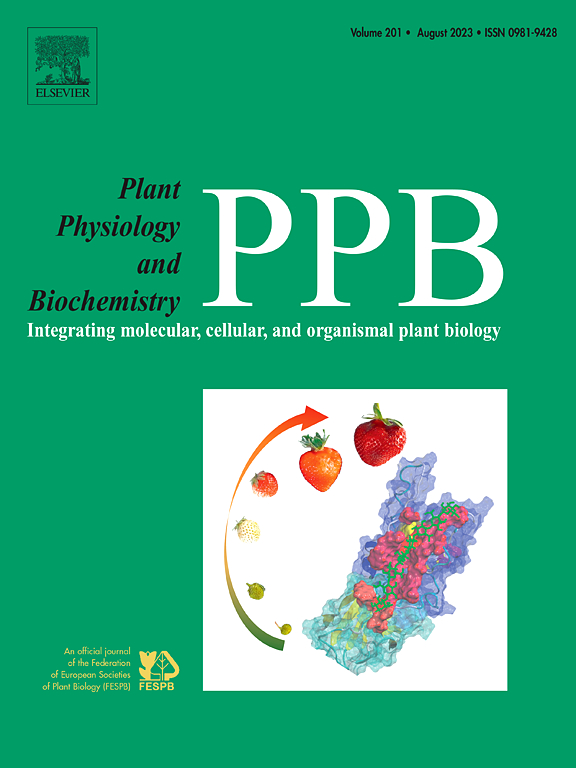Eggplant WRKY26 functions as a positive regulator of cold tolerance by inducing autophagy
IF 5.7
2区 生物学
Q1 PLANT SCIENCES
引用次数: 0
Abstract
Eggplant (Solanum melongena L.), a thermophilic plant, is highly susceptible to cold stress, which significantly impacts its growth and productivity. While WRKY transcription factors are known to play key roles in plant responses to environmental stresses, their involvement in cold stress tolerance in eggplant remains largely unexplored. Here, we identified and characterized SmWRKY26, a group I WRKY transcription factor closely related to SlWRKY33 and AtWRKY26. Subcellular localization and transcriptional activating activity assays confirmed that SmWRKY26 was a nuclear-localized transcriptional activator. Expression analysis revealed that SmWKRY26 was induced by exogenous hormones and cold stress. Overexpression of SmWRKY26 in eggplant enhanced cold tolerance by promoting the stability of plasma membrane, maintaining photosynthetic efficiency, enhancing the capability of antioxidants, and accelerating the degradation of insoluble protein. In contrast, SmWRKY26 gene knockout mutants showed the opposite trend. RNA-seq results revealed that SmWRKY26 mainly regulated genes in the mRNA surveillance pathway, protein processing in the endoplasmic reticulum and autophagy. Further experiment verified that SmWRKY26 positively regulated the expression of autophagy-related genes and facilitated the formation of autophagosomes under cold stress. These findings highlight a novel regulatory mechanism for cold stress tolerance mediated by SmWRKY26 in eggplant, offering a valuable genetic resource for developing cold-tolerant cultivars.
WRKY26通过诱导茄子自噬,发挥了茄子耐冷性的正向调节作用
茄子(Solanum melongena L.)是一种嗜热植物,对冷胁迫非常敏感,冷胁迫严重影响其生长和产量。虽然已知WRKY转录因子在植物对环境胁迫的反应中起关键作用,但它们在茄子的冷胁迫耐受性中所起的作用仍未得到充分研究。在这里,我们鉴定并表征了SmWRKY26,一个与SlWRKY33和AtWRKY26密切相关的I组WRKY转录因子。亚细胞定位和转录激活活性实验证实SmWRKY26是一个核定位的转录激活子。表达分析显示SmWKRY26受外源激素和冷胁迫诱导。SmWRKY26在茄子中的过表达通过促进质膜稳定性、维持光合效率、增强抗氧化能力和加速不溶性蛋白的降解来增强茄子的耐寒性。而SmWRKY26基因敲除突变体则表现出相反的趋势。RNA-seq结果显示,SmWRKY26主要调控mRNA监视通路、内质网蛋白加工和自噬中的基因。进一步实验证实,SmWRKY26正向调节冷胁迫下自噬相关基因的表达,促进自噬体的形成。这些发现揭示了SmWRKY26介导的茄子耐冷胁迫调控机制,为培育茄子耐冷品种提供了宝贵的遗传资源。
本文章由计算机程序翻译,如有差异,请以英文原文为准。
求助全文
约1分钟内获得全文
求助全文
来源期刊
CiteScore
11.10
自引率
3.10%
发文量
410
审稿时长
33 days
期刊介绍:
Plant Physiology and Biochemistry publishes original theoretical, experimental and technical contributions in the various fields of plant physiology (biochemistry, physiology, structure, genetics, plant-microbe interactions, etc.) at diverse levels of integration (molecular, subcellular, cellular, organ, whole plant, environmental). Opinions expressed in the journal are the sole responsibility of the authors and publication does not imply the editors'' agreement.
Manuscripts describing molecular-genetic and/or gene expression data that are not integrated with biochemical analysis and/or actual measurements of plant physiological processes are not suitable for PPB. Also "Omics" studies (transcriptomics, proteomics, metabolomics, etc.) reporting descriptive analysis without an element of functional validation assays, will not be considered. Similarly, applied agronomic or phytochemical studies that generate no new, fundamental insights in plant physiological and/or biochemical processes are not suitable for publication in PPB.
Plant Physiology and Biochemistry publishes several types of articles: Reviews, Papers and Short Papers. Articles for Reviews are either invited by the editor or proposed by the authors for the editor''s prior agreement. Reviews should not exceed 40 typewritten pages and Short Papers no more than approximately 8 typewritten pages. The fundamental character of Plant Physiology and Biochemistry remains that of a journal for original results.

 求助内容:
求助内容: 应助结果提醒方式:
应助结果提醒方式:


